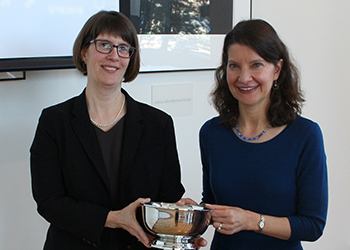Big Data and the Americans with Disabilities Act
Sharona Hoffman explores the future of employment and the Americans with Disabilities Act in BU Law’s annual Pike Lecture.

Sharona Hoffman, Edgar A. Hahn Professor and codirector of the Law-Medicine Center at Case Western Reserve University School of Law, delivered Boston University School of Law’s Thirteenth Annual N. Neal Pike Lecture on Health Law. Her talk focused on the Americans with Disabilities Act (ADA) and how its protections can be developed to meet the new capacities for big data.
Hoffman argued for an expansion of the ADA to include people who are vulnerable to illnesses such as cancer or a degenerative cognitive illness in the future. Big data—large collections of personal information—allows researchers to derive predictive information based on both qualitative and quantitative factors. Hoffman believes employers could use these predictions to discriminate in their hiring processes.
“Employers want data because they want to figure out which employees are going to be productive workers, without absenteeism problems, and most importantly—workers with low healthcare costs,” Hoffman said.
Recognizing this practice, Hoffman expounded upon the ways employers could acquire such information about their workers.
While medical exams are regulated by the ADA, a “window of opportunity” exists for employers to gather this information. During the period between the job offer and commencement, employers can request medical exams and make disability-related inquiries. These tests could reveal predictive information to the employer and result in a job offer being rescinded.
An employer could also collect information through social media posts and company wellness programs. Both would present employee information and avenues for predictive data.
Data brokers, businesses that sell collected information to third parties, provide employers with another window into their employee’s health. Hoffman described an encounter with an employee of data broker Acxiom who revealed that data about individuals and their diseases could be sold.
In terms of hospital and doctors’ records, Hoffman cautioned about the efficacy of de-identification. The Health Insurance Portability and Accountability Act mandates the removal of 18 identifiers within patient data. While this protects information with health care providers and health insurers, Hoffman warned about the possibility of re-identification.
“Eighty percent or more of the population, at least in certain areas, can be identified by three factors alone: sex, zip code, and birthdate,” she said. “If you have that information, no names, no addresses, just this information, it is pretty easy to identify people.”
As researchers continue to amass more health information, the creation of data algorithms to aggregate health records could give more data to employers. Hoffman believes this discrimination isn’t only reliant on traditional health information. She explored studies that connected health to voter participation in midterm elections, credit scores, and purchases at bicycle shops.
These opportunities for discrimination fueled Hoffman’s call to broaden the scope of the ADA. The act is intended to prevent discrimination on three fronts: For those with a current physical or mental impairment that limits a major life activity, those with a record of an impairment, and those who are perceived to have an impairment by their employers.
In Hoffman’s view, the law does not reach those who are currently healthy but possess somatic markers of a possible future impairment. As an example, she shared a study that found that women who have not given birth are at a higher risk for breast and ovarian cancer. Employers may see these employees as unappealing and make job decisions based on these perceptions.
Broadening the ADA would protect employees from termination based on these predicted health outcomes. Hoffman noted that proving this discrimination would be very difficult. Still, she hoped that this action would deter employers from such behavior.
“The great hope of employment discrimination laws is most employers want to do that right thing—you need to give them some guidance and they will hopefully refrain from discrimination,” Hoffman said.
Hoffman does believe there are some nuances where employers could make exceptions. She noted when employees make conscientious decisions to partake in risk-taking behaviors such as smoking or extreme sports. Her solutions also advocated for an employer to disclose their data mining practices.
Hoffman’s talk expands on her latest book, Electronic Health Records and Medical Big Data Law and Policy.
Reported by Josee Matela (CAS/COM’20)
Related News
- On the Reproductive Beat with Columbia Law Professor Carol Sanger
- Exploring the 21st Century Cures Act
- Huberfeld, Outterson Update The Law of American Health Care